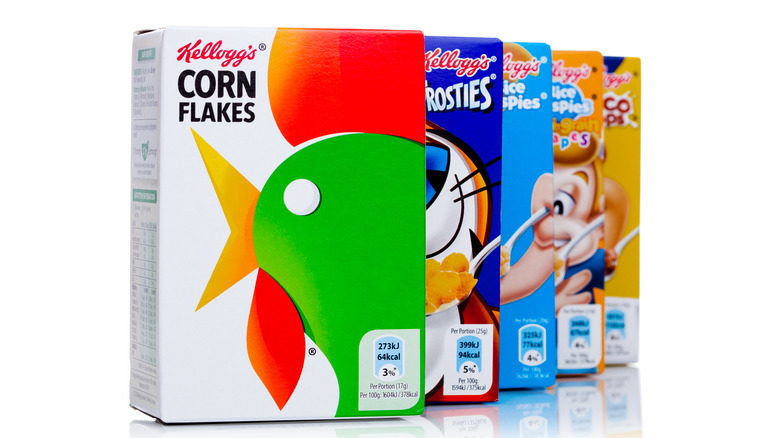The Real Reason Kellogg's Faced Legal Trouble In The UK
The Dietary Guidelines for Americans are very clear about how much sugar can be added to your diet without compromising your health. Per the Harvard School of Public Health, all Americans two years and older should restrict their sugar intake to less than 10% of the total number of calories consumed per day. For someone eating 2,000 calories a day, that translates to roughly 50 grams, or 12 teaspoons, of sugar daily.
If, given just how much sugar is found in processed foods today, you don't think that sounds like very much, you'd be right — particularly if you're a fan of breakfast cereals. Per Kellogg's U.K., 100 grams, or about half a cup of Coco Pops, contains 17 grams of sugar. Meanwhile, a serving of Crunchy Nut Bites has 27 grams of sugar, and a half cup of Frosties clocks in at a whopping 37 grams of the white stuff. Thanks to these nutritional facts, Kellogg's has found itself in hot water with the U.K. government.
Kellogg's thinks the UK government has its cereals all wrong
Last April, the U.K. government announced upcoming food regulations in efforts to "help tackle obesity." The rules, which go into effect in October of this year, will restrict the way retailers can promote "foods and drinks that are high in fat, salt or sugar" through discounts and product placement, both online and in stores.
Predictably, Kellogg's and its high-sugar cereals don't get a free pass — a fact the manufacturer has tried to debate with the government, per BBC. Kellogg's U.K. Managing Director Chris Silcock said the company feels the classification of its products as "less healthy" is incorrect, stating, "We believe the formula being used by the government to measure the nutritional value of breakfast cereals is wrong and not implemented legally." Why? The formula doesn't consider the milk that people typically add to their cereal, he argued, meaning "the full nutritional value of the meal is not measured." Kellogg's was so convinced of this argument that it took it to court.
UK judge rules against Kelloggs' argument
Unfortunately for Kellogg's, this was not an argument that U.K. Judge Thomas Linden was willing to entertain. In his ruling against the food company, the judge said Kelloggs' argument that its cereals "somehow become healthy products if they are consumed with milk is wholly unconvincing, as the addition of milk does not alter the nutritional profile of the products themselves," per The Washington Post.
Unsurprisingly, Silcock of Kellogg's disagreed with the judge, doubling down on the argument that "it is important that cereals are measured in a way which reflects how most people eat them — with milk" (via The Guardian). Still, the company said it will not take the case any further in court. Other entities, such as the U.K. Department of Health and Social Care, view Judge Linden's ruling as a victory. The agency sees the decision as a vote of confidence in the British government's actions to restrict both access to and the promotion of sugary cereals, "which contribute a significant amount of sugar to children's diets."


